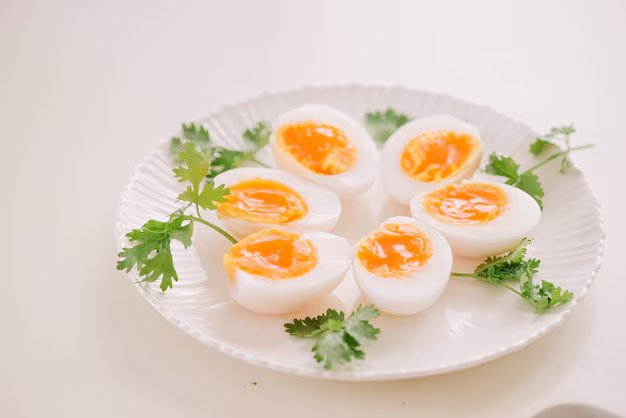How Long Do Boiled Eggs Stay Fresh in the Refrigerator?
Did you know that understanding how to properly store boiled eggs can help maximize their shelf life, ensuring you always enjoy a delicious and safe snack? Boiled eggs are not only a versatile snack, protein-packed breakfast, or salad topper, but they are also a staple in many households worldwide. But they don't last forever. Figuring out how long they are good for in the refrigerator can save you from unnecessary waste and potential foodborne illness. So, let's crack into the details.
🥚 How Long Are Boiled Eggs Good For?
Boiled eggs stored in the refrigerator should generally be consumed within one week. This time frame keeps them safe to eat while ensuring they remain fresh and tasty. However, the longevity of boiled eggs can vary depending on factors like preparation methods, storage conditions, and whether they are peeled or unpeeled.
Peeled vs. Unpeeled
- Peeled Eggs: Once peeled, boiled eggs can lose moisture more rapidly, affecting both texture and taste. To optimize freshness, it's best to store peeled eggs submerged in water, changing the water daily, or ensure they are in an airtight container.
- Unpeeled Eggs: These retain their protective layer, helping them last longer. It’s usually advisable to store unpeeled boiled eggs with their shells intact until you are ready to consume them.
🧊 Best Practices for Storing Boiled Eggs
Keeping your boiled eggs fresh involves following some reliable storage techniques:
Refrigeration as Key
- Temperature: Store boiled eggs in a refrigerator set to a temperature below 40°F (4°C). Consistent cold storage helps inhibit bacterial growth.
- Placement: Ideally, place boiled eggs on an interior shelf rather than the refrigerator door, where temperatures can fluctuate more with frequent opening and closing.
- Container Use: Use labeled airtight containers to separate boiled eggs from strong-smelling foods, as eggs can absorb odors.
Proper Labeling
Labeling your eggs with the boiling date is a simple step that prevents uncertainty about freshness. Initiating this as a practice will help you keep track of their age, ensuring they don’t overstay their welcome in the fridge.
🕵️♂️ Recognizing Signs of Spoilage
Understanding how to identify spoiled boiled eggs is crucial for health safety:
- Smell: A sour or sulfurous smell indicates spoilage.
- Appearance: Shells appearing slimy or having unusual textures or colors can signal it's time to discard them.
- Taste and Texture: Any variation in the expected taste or texture, such as an unusually chalky interior, suggests it's best not to consume the egg.
🥗 Making the Most of Boiled Eggs
Boiled eggs are the perfect example of a simple yet versatile ingredient. Here are some popular ways to enjoy them:
- Breakfast Boost: Slice them into toast for a protein-rich start to your day.
- Salad Enhancement: Add them to salads for extra texture and nutrients.
- Quick Snack: Season with salt and pepper for a quick and easy snack.
- Egg Salad: Mash with mayonnaise and spices for a tasty spread or sandwich filling.
🔄 Transition from Boiled to Use
To maximize the nutrient benefit and avoid wastage, always plan the usage of your eggs. Rotate your stock, use the oldest first and experiment with recipes based on their freshness.
🥡 Beyond the Basics: Egg Preservation Techniques
What happens if you have more boiled eggs than you can consume in a week? Here are some alternative preservation techniques to extend their shelf life:
Pickling
Pickling boiled eggs is a traditional method that not only preserves them but also introduces unique flavors. Use a mixture of vinegar, salt, and spices to cover the eggs, and store them in the refrigerator. Pickling changes the egg’s texture and taste, creating a delightful, tangy treat that lasts a few months when refrigerated.
Freezing (Peeled Only)
Although not commonly recommended due to texture changes upon thawing, peeled boiled eggs can be frozen for later use in dishes where texture is less crucial, like egg salads or purees. Make sure they are well-wrapped to prevent freezer burn.
🔍Summary: Keeping Boiled Eggs Fresh 📅
Here’s a quick guide to remember:
- Refrigeration Time: Up to 7 days
- Storage Practices: Leave unpeeled, if possible
- Container Use: Airtight, labeled, and away from strong odors
- Signs of Spoilage: Discard if there’s a bad smell or discoloration
This easy-to-reference guide can be a game-changer in your kitchen routine, ensuring you enjoy the freshness of boiled eggs without worry.
🚀 Taking Action: Safe Egg Consumption
With this knowledge, you’re now equipped to not only extend the lifespan of your boiled eggs but also to make them an ongoing part of your meal prep regime. Remember, food safety is about being proactive. By practicing excellent storage habits, you’re not only ensuring delicious results but also protecting your health.
Bon appétit! 🥚

